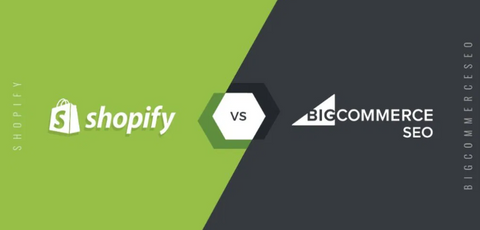BIGCOMMERCE VS. SHOPIFY COMPARISON

Choosing a platform for your e-commerce store can be daunting, primarily because there are many of them out there. Each with its pros and cons. Some are easy to use and more suitable for beginners, while some are not so easy to use, and they may require little programming knowledge.
Instead of looking at all these platforms at a time, let’s take a look at the best two. Shopify and BigCommerce. Sooner or later, you’ll encounter this dilemma of choosing between these two if you’re planning on having an e-commerce store. So, which one to choose? Don’t sweat it! Let’s take you through the comparison.
BigCommerce vs. Shopify: Background Info
Shopify was founded in the year 2006, with its headquarters located in Ottawa, Ontario, Canada. They are one of the fastest-growing e-commerce companies, and they boast of over 600,000 online retailers, with new additions every day.
BigCommerce started operations in 2009 in Sydney, Australia. Although they now have their corporate headquarters in Austin, Texas. They serve more than 100,000 online stores.
From the look of things, Shopify seems to attract much more growth than BigCommerce, thanks to its simplicity. However, both companies are growing for good reasons; they may just be slightly suited to different types of users.
BigCommerce vs. Shopify: Pricing
Pricing is vital when it comes to purchasing. What’s a good product when you simply cannot afford it? Before choosing any of these two as your desired e-commerce platform, you need to know how their pricing is like.
Shopify is cheaper to get started, and with just $9. The plan is Shopify Lite, and with this plan, you don’t need a separate new website to serve as an online store. You will get a “buy button” instead, which you can place on your existing site or anywhere online.
BigCommerce doesn’t have any Lite option; its pricing begins with a fully-fledged online store. Their pricing starts with the BigCommerce Standard, which is at the same level as the fully-fledged own for Shopify named Shopify Basic. You’ll get Shopify Basic at $29, while BigCommerce is $29.95.
The two platforms give almost the same features for these two plans, from unlimited storage to unlimited bandwidth, 24/7 live chat + phone, blog module, and more. The only significant difference between these plans is the fact that BigCommerce number of staff accounts is unlimited compared to Shopify Basic, which allows only two.
Shopify Plan and Shopify Advanced Plan goes for $79 and $299, respectively. Similarly, BigCommerce Plus and BigCommerce Pro go for $79.95 and $299.95, respectively. When you upgrade to these plans, you get more advanced features and support. All-encompassing, you could see both platforms look almost the same in terms of pricing, except for the availability of Shopify Lite on Shopify.
BigCommerce vs. Shopify: Extensions
Talking about extensions, both platforms have a great and super deal for you. They have enough extensions that you need for the proper and enhanced functioning of your store. You can find more than 500 extension apps in the Shopify store. Extensions for SEO, social media integration, fulfillment, customer support, and many others. Both free and paid ones.
With BigCommerce, you can get some of these extensions in their catalog, too, both free and paid ones. Just like Shopify, you can add additional features to your site, with just a few clicks of the mouse.
Shopify and BigCommerce both look okay in terms of extensions; however, in terms of the selection and numbers of these extensions, BigCommerce is slightly less rich than Shopify.
BigCommerce vs. Shopify: Features
With every iota of truth, both platforms come with all standard e-commerce features you could think of. These platforms will both give you:
- Access to unlimited products in your store.
- Unlimited orders
- Unlimited bandwidth
- 24/7 live chat and phone support.
- A fully-fledged online store.
- Unlimited storage
- Multiple payment gateways
- Store optimization for mobile
- Shipping integration
- Tax calculation automation
- Customer accounts
- Sales reports
- Inventory management
- SSL integration
- And many more
All these can be found on both platforms, although Shopify can be quite simple and easy to use when it comes to things like multilingual setups and built-in tools for dropshipping. On the flip side, BigCommerce boasts of multi-layered hosting security and DDOS protection.
Load Time and Page Speed
A look at the load time and speed of these two great platforms show us they both load very fast and quite okay. But of course, one will be faster. Visitors expect your site to load fast. If it doesn’t, chances are they will exit. Overall, in terms of speed and load time, Shopify leads the race with an average load time of 1.3 seconds while BigCommerce’s average load time is 2.2 seconds.
There you go! The comparison you may need for you to choose between BigCommerce and Shopify. The key in choosing is to look at what each of them can do, and match it to your needs in an e-commerce platform. Luckily, above are some keys! The features, pricing, extensions, and load time.
